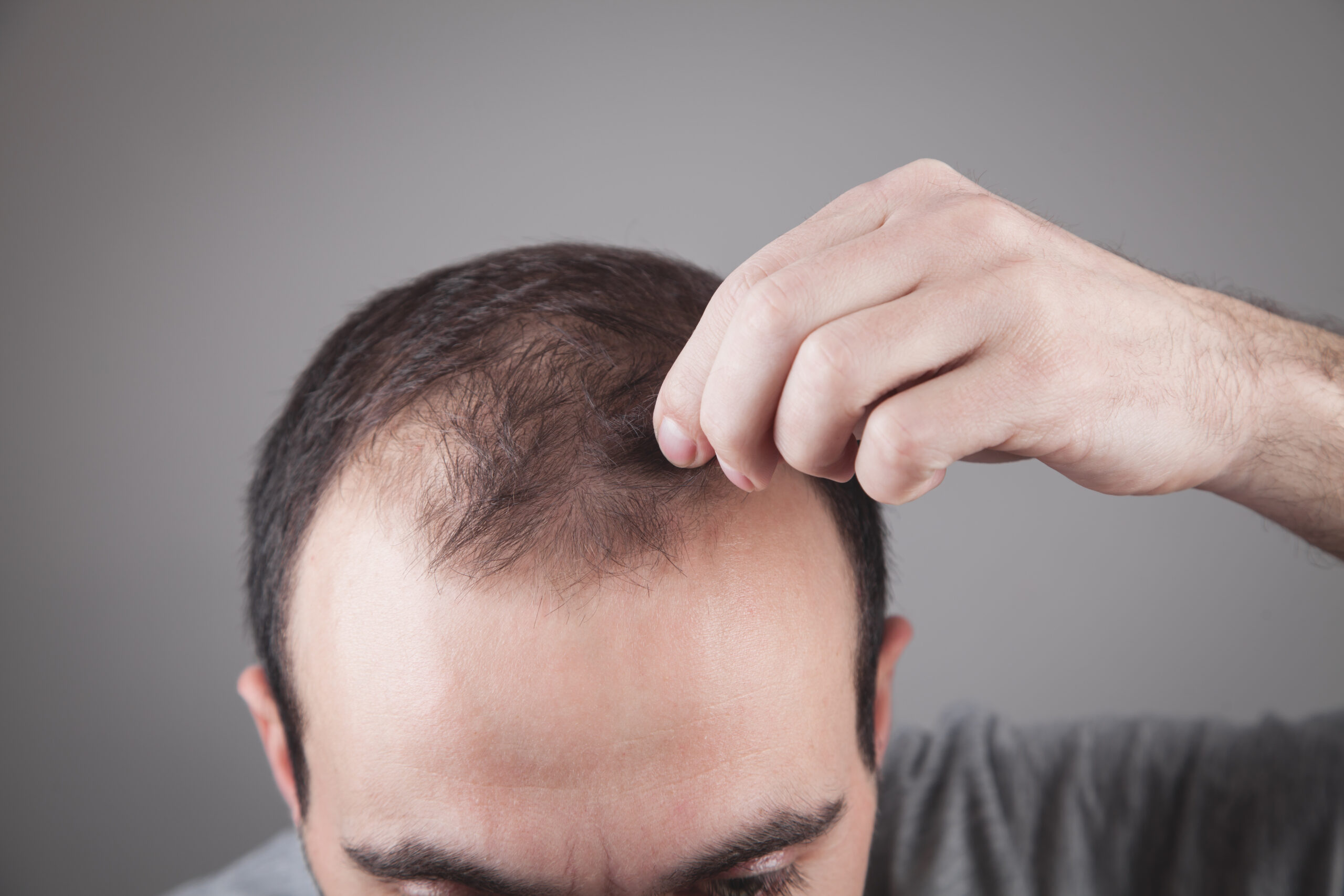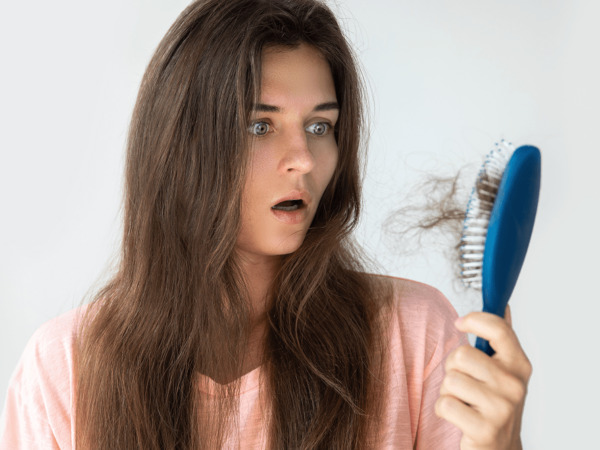
What is the relationship between Hypothyroidism and hair loss?
- What does the thyroid do?
- What effect do thyroid hormones have on skin and hair?
- Hyperthyroidism and its relationship to alopecia
- Do thyroid problems cause your hair to fall out?
- The main thyroid disorders and how they affect hair health
- How to prevent thyroid-related hair loss?
- Does hair lost due to hypothyroidism grow back?
The most common type of alopecia, which affects both men and women, is androgenic alopecia. Its causes can be hormonal or genetic, but we know that there are other reasons why hair can weaken and fall out, also linked to hormones. Among them is unusual thyroid behaviour, which results in a thyroid gland being over or under active.
Hypothyroidism, or an underactive thyroid, can cause many symptoms, from weight gain to fatigue. Because it develops slowly, many people don’t notice that they are suffering from this hormone deficit problem until months or years have passed. At the other extreme, excessive production of hormones by the thyroid causes what is known as hyperthyroidism. Both pathologies affect hair health and can cause hair loss, in addition to dryness, fragility or thinning of the hair on the scalp and the rest of the body.
What does the thyroid do?
The thyroid is an endocrine gland responsible for generating the hormones that regulate metabolism; that is, the chemical processes that break down the food we eat to produce energy. Therefore, its function affects the overall functioning of the body.
The thyroid is located just below the larynx, near the base of the neck. There are two hormones produced by the thyroid gland that help control metabolism, called T3 and T4 hormones. The thyroid releases the hormones into the bloodstream, which distributes them throughout the body. Another gland, called the pituitary gland, receives information from the hypothalamus and tells the thyroid how much of these hormones the body needs.
So, the thyroid has to do with the speed of the heartbeat, the depth of breathing as well as weight gain and loss. It can also help control women’s body temperature, memory, cholesterol levels, and menstrual cycles. It also affects the hair growth cycle. Its task is to regulate these cycles and stimulate the hair follicles, balancing the production of sebum so that the hair is nourished and strong.

What effect do thyroid hormones have on skin and hair?
If one of the most important hair-related functions of thyroid hormones is to regulate hair cycles, it makes sense that their improper function would alter those cycles and lead to diffuse hair loss. How quickly it happens will depend on the patient, but it is common for those who suffer from alterations in the thyroid to notice changes in their hair health.
The skin plays a fundamental role in protecting the body against dehydration, mechanical trauma and microbial invasion. The epidermis is composed of keratinocytes and, to a lesser extent, resident dendritic cells, T lymphocytes, melanocytes and Merkel’s neuroepithelial sensory cells. Dendritic cells and T cells protect the skin from microbial invasions, making the skin an active immune organ. The hair follicles and sebaceous glands, two epidermal appendages, are embedded in the dermis and separated from it by the basal membrane. The basal membrane, in turn, is made up of materials secreted by epidermal keratinocytes and dermal fibroblasts. Thyroid problems affect this whole process and, therefore, the health of our skin and hair.
We know that the most common thyroid-related diseases affect women more than men. As such, hyperthyroidism usually appears between the ages of 20 and 40, and hypothyroidism is more common during menopause.
Hypothyroidism involves insufficient production of thyroid hormones, due to a disruption in their production, specifically the T3 and T4 hormones. This affects other processes in the body, including the development of hair at the root. In this way, the telogen phase lasts longer and anagen is delayed. That means the development stage is shorter and the falling-out stage lasts longer. Keratin also loses quality and the hair appears drier and rougher. The result is dull hair and a sparsely populated scalp due to the hair falling out and being unable to be replaced by new hair.
Some drugs used to treat thyroid conditions can also contribute to hair thinning. Carbimazole and propylthiouracil are antithyroid drugs that can sometimes lead to hair loss. Sometimes it can be difficult to tell whether the medication or the thyroid disease is the cause of thinning hair, due to the long life cycle of the hair.
Hyperthyroidism and its relationship to alopecia
In hyperthyroidism, an excessive amount of hormones is produced, which can cause diffuse hair loss due to the acceleration of hair growth cycles. In short, it is the opposite of hypothyroidism, where the hair growth cycle is made longer. Thus, hairs are produced and die more quickly. The most visible consequences are thinner, fragile hair that’s also greasier and less full bodied.
Do thyroid problems cause your hair to fall out?
The most recent studies agree that hair loss (as well as its breakage or thinning) occurs in both hypo and hyperthyroidism. As we said before, the very important hormones T3 and T4, which regulate dozens of body processes, are affected in thyroid conditions. Thyroid problems are often the root cause of alopecia. In a study cited in the International Journal of Trichology, advanced age is also associated with increased thyroid-related hair loss.
In fact, as a general rule, if you suffer from alopecia or hair loss of any kind but do not know if you have any thyroid disorders, it is advisable to consult your doctor and request a thyroid test.

The main thyroid disorders and how they affect hair health
Thyroid disorders are hypothyroidism and hyperthyroidism. These problems, when severe and prolonged in nature, can cause hair loss. The loss is diffuse and affects the entire scalp rather than specific areas. The hair appears to be thinning uniformly.
How to prevent thyroid-related hair loss?
Hair growth is cyclical, it falls out and grows back, even if we don’t realise it. As we’ve seen, thyroid disorders caused by the alteration of T3 and T4 hormones can cause hair loss, especially when the problems are serious or have gone untreated for a long time.
To begin with, it is important to go to an endocrine specialist. It’s essential to keep track of your symptoms, note how long you’ve been taking your medication, go for regular thyroid checkups and doctor’s appointments, and ask about all possible treatment options and combinations that might work for you, especially if your hair loss continues after medical treatment.
In addition, it’s advisable to learn how to manage stress and take care of your diet to maintain optimal hair health. A low level of iron causes a low level of ferritin, a blood protein associated with hair growth. Thyroid problems also cause a low level of ferritin, which means that you have to check your ferritin and iron levels at the same time as your thyroid.
The key to a treatment to prevent hair loss due to thyroid issues is to balance the levels of hormones that have been altered. This requires medical treatment and waiting for hormone levels to be restored. Keep in mind that it can take months for this to be reflected in hair health. In addition, widely used and effective drugs against alopecia, such as Minoxidil or Finasteride do not work against hair loss caused by thyroid hormonal imbalances.
In addition to essential pharmacological treatment, hair treatments can be added to accelerate hair recovery, as well as the local application of specific shampoos and lotions. Likewise, it can be beneficial to add supplements that contain B complex vitamins and minerals such as magnesium, zinc, or potassium.
If you’ve noticed symptoms of hypothyroidism or hyperthyroidism and changes to your hair, the Insparya medical team can help you with the diagnosis and treatment so you can get your health and strong hair back. In addition, we offer treatments that will help you improve your hair quality, such as capillary mesotherapy, Platelet Rich Plasma (PRP) and low frequency laser (Low Laser Therapy). Whether individually or combined, they will nourish and revitalise your hair and help it look good again.
Does hair lost due to hypothyroidism grow back?
Hypothyroidism and hyperthyroidism, as we have seen, can cause hair loss. It’s a diffuse loss that affects the entire scalp, so the hair appears evenly sparse. However, it is common for hair to grow back if the thyroid disorder is successfully treated. It will, of course, take several months and can be an incomplete growth.





